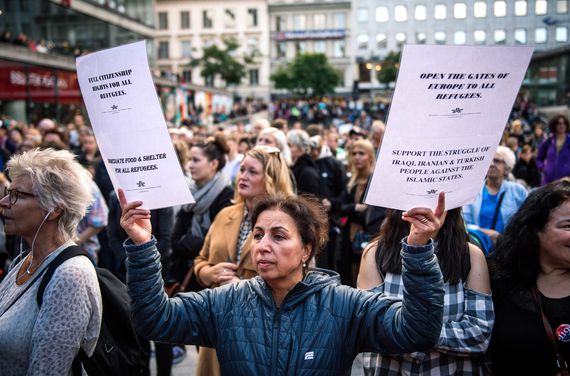
Maria Booth and I sit at a table at Mälarpaviljongen, a gay-friendly bar and cafe in Stockholm. It’s a sunny, breezy day on the Baltic waterway that surrounds the city. The cafe’s floating patio bobs gently in Riddarfjärden Bay.
We’re talking about Facebook.
She’s worried about a change taking place in her country that she saw first on the world’s biggest social network: People she knew were posting comments against immigrants, calling them criminals and drains on society.
“It has become perfectly legitimate to say we should close our borders,” says Booth, her voice tinged with disbelief.
To my American ears, the sentiment seems commonplace — especially in this election year. To Booth, it’s unprecedented.For more than 70 years, Sweden has been a haven for people escaping war and persecution. In 1943, it gave asylum to 7,200 Danish Jews — virtually Denmark’s entire Jewish population — after they were smuggled in by fishermen crossing the narrow Kattegatt strait. Sweden later became a beacon for people fleeing the Soviet bloc, the revolution in Iran and war crimes in Bosnia.
Swedes proudly call their country a “humanitarian superpower.”

Jonathan Nackstrand/AFP/Getty Images
That singular culture began to chip a few years ago as migrants came here in increasing numbers, drawn by Sweden’s welcoming reputation, generous welfare benefits and laws allowing permanent residency. Now Sweden’s humanitarian identity is at risk of shattering — in part because the social media echo chamber broadcasts a growing hostility toward immigrants.
I visited Sweden and Finland for two weeks in June to see how these two tech-savvy countries are reacting to the largest surge of refugees andmigrants either has experienced in years. I found that the tech industry has taken on a large role in helping refugees find work and start new businesses in both countries. And I learned that Facebook and Twitter are emboldening people to express opinions they never felt they could before. The effective use of social media has also helped anti-immigrant political parties attract people under 25 to their cause.
Call it the ideology feed.
Saying the unsayable
In effect, social media gives Swedes license to break away from a culture of self-censorship calledåsiktskorridor, or “opinion corridor,” that defines what is and isn’t OK to say.

Screenshot by CNET
Until very recently, anyone who talked about immigration would get “the evil eye,” says Booth.
“Swedes are extremely conformist, and a good discussion in Sweden is one where everyone agrees.”
It’s why posts and tweets that veer from the country’s humanitarian identity are so shocking.
That’s especially true if they’re overtly racist, like the tweets from Soldiers of Odin, an aggressively anti-immigrant group that started in Finland and has now spread to Sweden. Consider a comment posted earlier this week on the group’s Facebook page. Converted from Finnish to English by Google Translate, it reads: “Satan spics goddammit. My ax has a new tourist destination.” The page has more than 46,000 followers.
Tobias Andersson isn’t anywhere near as odious. As head of Young Swedes, the youth organization of the conservative political party Sweden Democrats, he tends toward more-measured remarks. A tweet in both Swedish and English earlier this month showed a character from “South Park” commenting on a radical Muslim randomly stabbing a woman to death: “It’s the religion of peace…” it starts.
A new generation
Finns and Swedes share a love of coffee, saunas and celebrating the midnight twilight of summer. But they’re not exactly the same. Cultural stereotypes about Finns paint them as more taciturn, more focused on work and with a darker sense of humor than their neighbors to the west. Finns whip themselves with birch branches in the sauna; Swedes do not.
More important to this discussion, Finland had received relatively few migrants. Two years ago, 3,651 refugees applied for asylum. Last year’s 32,000 requests was a jolt to the system.

Laura Hautala/CNET
That much is obvious when I meet with State Secretary Samuli Virtanen, a member of the True Finns party and an advisor to the Finnish minister of foreign affairs. After quizzing me on my Finnish last name (I’m an American with Finnish ancestry) and offering me coffee, he tells me why Finns are questioning whether to take in tens of thousands of refugees.
Finland has an unemployment rate of more than 9 percent and an economy that’s barely grown since 2008. The country’s beloved social services, like 500 days of unemployment insurance, cheap health care — and a state-supplied gift of baby clothes, bedding and baby care products to all expectant parents — are under threat.
“When we are tightening the belt, why are we at the same time welcoming migrants?” Virtanen says citizens ask.
One noteworthy point: True Finns is the same political party whose 2011 manifesto said, “Young women should study less and spend more time giving birth to pure Finnish children.”
Despite that earlier rhetoric, the True Finns party used social media to gain a strong following with voters under 25, says Niko Pyrhönen, a researcher at the University of Helsinki Center for Research on Ethnic Relations and Nationalism.
“Once they started to have success in social media, they became one of the most successful parties among young people,” Pyrhönen tells me during a conversation in his narrow, book-crammed office. Only the polar opposite Green Party has more young-adult supporters. Both parties are social media savvy, Pyrhönen says.
“The True Finns gave [young people] an arena to debate politically online,” Pyrhönen says, “and to generate a kind of collective identity of being ‘for Finland.'”
Fear of backlash

Laura Hautala/CNET
Refugees are well aware of the growing backlash. “After Cologne, people got very aggressive,” says Mustafa Abdulameer, who reached Finland from Iraq after traveling across eight European borders by foot, train and bus. He’s referring to the infamous sexual assaults during last New Year’s Eve when,authorities now think, about 2,000 men attacked 1,200 women in Cologne and other German cities. It’s unclear how many of the men were foreign nationals.
Abdulameer, 22, is fasting for Ramadan and can eat, drink and smoke only during the three hours of twilight near the summer solstice in Helsinki. He tells me to drink the Rooibos tea he just bought me. It’s still three more hours before he can break his fast.
Tall and lanky, Abdulameer wants to become a business and marketing consultant for fellow refugees’ companies. He was granted asylum in early June. “People hear I’m from Iraq,” he says, “and they’re afraid I’m a thief or I will do a crime.”
He gets by in the new world he’s entered, and most people are kind to him — but he knows he has to set a good example and show that Iraqis can be trusted.
Echo chambers
The conversations happening on Facebook and Twitter have echoed in the parliaments of both countries. This month, the Finnish Justice Ministry announced new rules limiting the rights of asylum seekers to appeal denials. Finland expects to deport more than 22,000 refugees.

Sofie Sagfossen
Sweden tightened its previously generous asylum law this past June. Now asylum seekers under 25 can be granted permanent residence only if they’ve finished high school and can work for a living. Permission to bring in relatives will be granted only if the applicants prove they can support their relatives.
People have told Tino Sanandaji his Facebook postings influenced public debate. An economist and researcher for the Institute for Economic and Business History Research in Stockholm, he’s also a Kurdish immigrant from Iran.
He posts regularly in Swedish about the impact of immigrants on Sweden’s economy. “My sort of shtick is I’m critical about what I perceive to be biased facts on the issues in Sweden,” he tells me in a phone conversation.
“Right now foreign immigration is the single most important issue in the country. On one side people are giving exaggerated negative facts — like immigrants are murderers and rapists. On the other, the government is giving extremely positive spin,” he says. “I criticize the idea that taking in refugees is good for the economy. It’s not good for the economy. We should instead increase aid to the UN.”
To Swedes like Booth — who personally knows Sanandaji — these are almost fighting words.
Incensed by anti-immigrant posts she’s read online, Booth volunteered with the Swedish Red Cross last fall. She stood in the Stockholm Central Station as trains rolled in from southern Sweden packed with asylum seekers, and as the refugees entered the station, she answered their questions and pointed them to resources.
[Source:-CNET]





